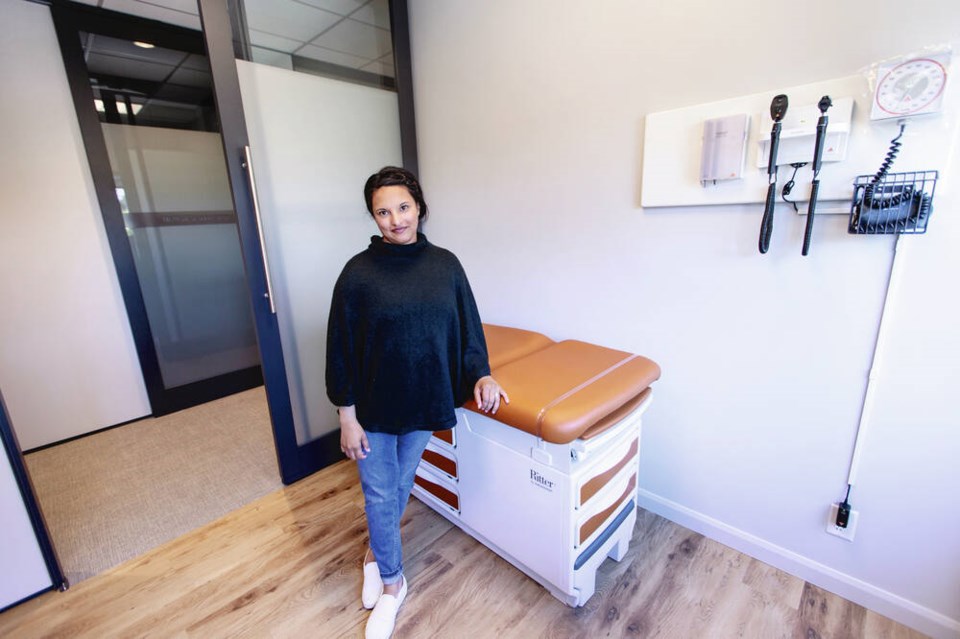Another family-practice clinic in the capital region is set to charge patients an annual membership fee for its services, provided by physicians who are not enrolled in the public Medical Services Plan.
Beta Therapeutics in Royal Oak is accepting new patients as of Nov. 1, charging a monthly fee of $110 — based on an annual cost of $1,320 — for its “family medicine membership.”
Clinic director Samantha Rocha said the clinic, on West Saanich Road, opted to charge fees “out of necessity,” adding it’s difficult to sustain a family medicine practice in Victoria, “where operating costs are prohibitive to even the most established practices.”
“We have tried very hard to balance the needs of all parties involved,” she said. “We are hoping that our model can provide access to comprehensive care for patients, while building a sustainable practice for primary-care providers with more focus on work-life balance.”
The clinic, originally established in 2019, will start with one family physician, Dr. Dan Cutfeet, who came to the West Coast from Ontario in 2010 and works in Alert Bay.
Beta Therapeutics says patients will be attached to a nurse practitioner or family doctor in Victoria and be entitled to consultations of 15, 20 and 30 minutes, the ability to make appointments online, and “all the typical services you would receive at a doctor’s office or walk-in clinic.”
The clinic aims to see patients within a week of requests.
Beta Therapeutics is hoping $110 per person a month is more affordable than the “concierge or executive medicine options out there,” said Rocha, adding some people have told her they would budget for such a fee given the importance of the service.
Physicians licensed by the College of Physicians and Surgeons of B.C. have a few options for billing. They can enrol with the Medical Services Plan and bill MSP directly for services to patients, or they can enroll but directly charge patients MSP rates, leaving patients the ability to seek reimbursement from MSP.
Doctors can also choose not to enroll with MSP, or to de-enroll, and charge patients directly. In general, patients cannot seek reimbursement from MSP for services from a doctor who is not enrolled in the plan.
Fewer than 0.1 per cent of family doctors de-enroll from MSP, and while the Health Ministry said it doesn’t have a lot of experience with this scenario, it says it is “not concerned de-enrollment from MSP poses a risk to our public health-care system at this time.”
The ministry said it expects all physicians to be compliant with the Canada Health Act and the Medicare Protection Act. “The Medical Services Commission is aware of concerns regarding charges by Beta Therapeutics and is following up as appropriate,” the ministry said in a statement.
Beta Therapeutics’ move follows an announcement by Saanich physician Dr. Perpetua Nkechi Nwosu of Perpetual Health Centre on Shelbourne Street that she will charge patients an annual fee of $1,500 — waived for children of patients — starting Nov. 1.
Some of Nwosu’s patients have said they can’t or won’t pay the fee, while others say they will because they don’t want to lose their family doctor.
Like the family physician at Beta Therapeutics, Nwosu is de-enrolling from MSP.
Premier John Horgan was asked Wednesday at a media event in Langford about doctors de-enrolling and charging fees.
While he didn’t say anything specifically about doctors charging patients, Horgan said the province is continuing to work with the federal government to “re-imagine health care so that we can meet the challenges of an aging population, which includes doctors.”
“Of course I’m concerned about the challenges we’re facing on delivery of public health services in Canada, not just in British Columbia,” said Horgan.
About one million people in B.C. who want a family doctor say they can’t find one, including about 100,000 on the south Island.
Horgan said there are more doctors age 70 or older on the south Island than in any other part of the country.
The province is working with the Doctors of B.C. on recruitment and retention of family physicians, new ways to compensate doctors, and plans to retain older doctors to mentor new ones, said Horgan.
The Doctors of B.C. and the province are in negotiations for a new Physician Master Agreement expected to be announced in the late fall.
Horgan said he’s encouraged having seen doctors working with the Health Ministry to find solutions to overhead costs, training, and retention challenges. Ottawa needs to work with the provinces on a human-resources strategy, “because we can’t just keep poaching from other parts of the country,” he said.
Last month, the province and Doctors of B.C. announced $118 million in temporary stabilization funding for family doctors in private practice and medical clinics to help with operational costs. Applications are open now and funding is available between Oct. 1 and Jan. 31, 2023, amounting to about $25,000 per physician.
Beta Therapeutics calls the temporary funding a welcome first step in addressing the state of primary care in B.C.
“The reality is, however, that those funds do not bring positive change for patients who are currently unattached to a family doctor and have been for some time now,” Rocha said.
>>> To comment on this article, write a letter to the editor: [email protected]



